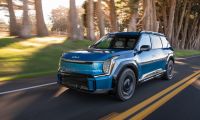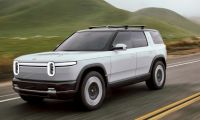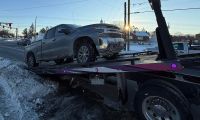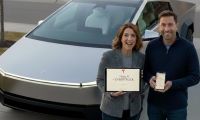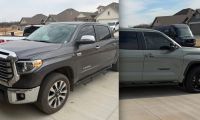The first clinic in August is in Brooklyn, Mich., west of Detroit. Other sites are Minneapolis, Orlando, Dallas, San Francisco and Blacksburg, Va.
The Connected Vehicle Drive Clinics are transportation department research projects for the Research and Innovative Technology Administration and the National Highway Traffic Safety Administration. The project is the brainchild of CAMP, also known as the Crash Avoidance Metrics Partnership.
CAMP is a consortium of eight automakers and exists to develop technology that will help vehicles avert collisions by communicating with other vehicles as well as traffic signals and other road infrastructure. Members of CAMP are General Motors, Ford Motor, Honda, Hyundai, Kia, Mercedes-Benz, Nissan, Toyota Motor and Volkswagen.
Drivers get warnings when risk of a crash is present.
“Connected vehicle technology has the potential to address 81% of all unimpaired driver related crashes,” said RITA Administrator Peter Appel. “We must take a serious look at how this technology will work in the real world to create a safer transportation system.”
The clinics are being held in part to see if the technology is accepted by a cross-section of Americans. The driver clinics will measure the acceptance by ordinary drivers of in-car collision warnings, “do not pass” alerts, warnings that a vehicle ahead has stopped suddenly and other similar safety messages, Appel said.
About 100 local drivers will participate in each city. Each clinic will have two dozen cars equipped with safety applications. After the clinics are over, the government will put thousands of wirelessly connected vehicles on the road to further test how the technology performs in the real world. The test market will begin in fall 2012.
The testing will help the government decide in 2013 if the technology is good enough to make the new technology standard equipment in new vehicles.
Hawke Fracassa writes about the auto industry from Detroit for TorqueNews.com. You can reach him at [email protected].
Image source: GM logo, from GM
Related articles
http://www.torquenews.com/1063/gm-ford-toyota-team-further-future-transportation
http://www.torquenews.com/397/ford-safety-leaders-working-bring-intelligent-vehicles-market
http://www.torquenews.com/1063/scarcity-ford-explorer-makes-gmc-acadia-attractive-alternative
Set as google preferred source






